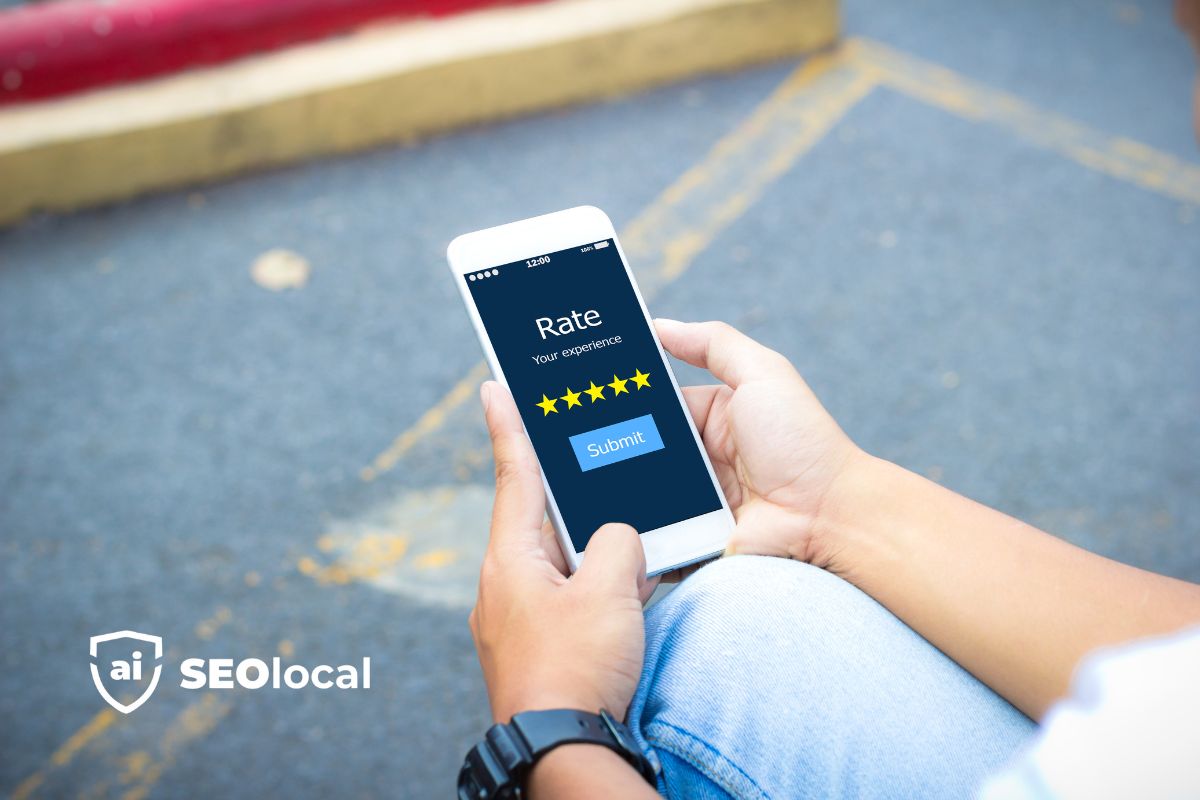
Blog
Get More Reviews for Local SEO

Did you know 46% of Google searches have local intent? Yet, 58% of companies lack a solid local SEO plan. This gap can hurt your business’s visibility and growth. Reviews play a critical role in bridging this divide.
Customers often rely on reviews to validate their choices. A higher volume of positive feedback can boost your local search rankings. Google places significant weight on review signals, accounting for 15% of its ranking factors, according to Moz.
At SEO Local, we focus on strategies like generating reviews, responding to feedback, and diversifying platforms. These tactics not only improve your online presence but also build trust with potential customers. Review velocity, keywords, and star ratings further enhance your SEO performance.
Key Takeaways
- 46% of Google searches are locally focused.
- Reviews help customers validate business choices.
- Google reviews influence 15% of local ranking factors.
- Review generation and response strategies are essential.
- Diversifying review platforms improves visibility.
What is Local SEO and Why Reviews Matter
Local SEO focuses on optimizing your online presence for specific geographic areas. It helps businesses connect with nearby customers searching for products or services. By targeting location-specific keywords, like “plumber Chicago,” you can improve your visibility in local search results.
The Basics of Local SEO
Local SEO combines website optimization with Google Business Profile management. Your website should include location-based keywords, while your Google Business Profile ensures accurate business information. This dual approach helps you appear in both the Map Pack and Local Organic Search results.
The Map Pack displays the top three businesses for a search query, while Local Organic Search shows additional listings. Both are crucial for attracting customers in your area. Optimizing for these results increases your chances of being seen by potential clients.
The Role of Reviews in Local Search Rankings
Reviews play a significant role in local SEO. According to Moz, review signals are the third most important ranking factor. They signal trustworthiness to Google and help your business stand out in local search results.
Widewail data suggests that medium-sized businesses should aim for at least 30 reviews per month. This benchmark ensures a steady flow of fresh, user-generated content, which algorithms favor. Positive reviews also encourage customers to choose your business over competitors.
By actively managing your reviews, you can enhance your local search rankings and build trust with potential customers. This strategy not only boosts visibility but also strengthens your online reputation.
How Reviews Impact Local SEO Rankings
The role of reviews in local SEO is more critical than many businesses realize. Google uses them as a key signal to determine your visibility in local search results. Understanding this can help you optimize your strategy effectively.

Google’s Perspective on Reviews
Google categorizes reviews under its “prominence” pillar, one of the three core factors in local search rankings. The other two are relevance and distance. Prominence reflects how well-known and trusted your business is, based on data like reviews and ratings.
Research shows that businesses with 4.2 to 4.5-star ratings tend to see higher conversion rates. This sweet spot signals credibility without raising suspicions of being too perfect. Google’s algorithms favor businesses that maintain consistent, positive feedback.
Review Signals as a Ranking Factor
Review velocity, or the rate at which you receive new feedback, plays a significant role. A steady flow of reviews signals to Google that your business is active and engaged. Moz highlights that diversity across platforms, like Yelp and TripAdvisor, can also boost your local pack rankings.
However, avoid practices like review gating, which violates Google’s content policies. Always encourage honest feedback without offering incentives. This approach ensures compliance while building a trustworthy reputation.
| Ranking Pillar | Description | Impact on Local SEO |
|---|---|---|
| Relevance | How well your business matches the search query. | Ensures your business appears for the right searches. |
| Distance | Proximity of your business to the searcher’s location. | Improves visibility for nearby customers. |
| Prominence | Popularity and trustworthiness based on reviews and data. | Boosts rankings and attracts more customers. |
By focusing on these factors, you can enhance your local SEO performance. Reviews are not just feedback; they are a vital part of your online presence and reputation.
Key Components of Reviews That Influence SEO
Understanding the elements that make reviews impactful can transform your SEO strategy. Reviews are not just feedback; they are signals that search engines use to evaluate your business. By focusing on specific components, you can enhance your online presence and attract more customers.
Volume of Reviews
The number of reviews your business receives plays a crucial role in SEO. A higher volume of feedback signals to search engines that your business is active and trusted. Aim for at least 30 reviews per month to dilute any negative feedback and maintain a positive reputation.
Review Ratings
Star ratings are another critical factor. Businesses with ratings between 4.0 and 4.5 tend to perform best in search results. A 4.5-star rating is ideal, as it balances credibility without appearing too perfect. This range helps avoid Google’s filters while attracting potential customers.
Keywords in Reviews
Natural integration of keywords in reviews can improve your relevance in search results. For example, phrases like “24-hour plumber” or “affordable car repair” can enhance your visibility for specific queries. Encourage customers to describe their experience in detail to naturally include these terms.
Freshness of Reviews
Freshness matters when it comes to reviews. 69% of customers consider feedback older than three months irrelevant. Aim for a steady flow of new reviews to keep your profile active. Additionally, respond to negative feedback within 72 hours to show your commitment to customer satisfaction.
By focusing on these components, you can leverage reviews to improve your SEO performance. Whether it’s the volume, ratings, keywords, or freshness, each element contributes to building trust and visibility for your business.
Strategies to Encourage More Reviews
Building a strong review strategy can significantly boost your business’s online presence. Reviews not only enhance credibility but also improve your search rankings. Here are proven methods to encourage customers to share their experiences.
Asking for Reviews Directly
Direct requests are one of the most effective ways to generate feedback. Studies show that 45% of customers respond positively to in-person asks. Train your team to request reviews after a successful service interaction.
Use tools like Google’s review link generator to simplify the process. These links can be shared via SMS or email, increasing completion rates by 30%. Personalized invitations, as seen in a Widewail case study, can boost responses by 40%.
Making It Easy for Customers to Leave Reviews
Simplify the review process to encourage participation. Embed review CTAs in post-service email receipts or SMS messages. This ensures customers can leave feedback with just a click.
Avoid review kiosks, as they can trigger IP address flags. Instead, focus on multi-channel approaches. Include review links in printed materials and digital signatures to reach a wider audience.
Using Email and Social Media to Request Reviews
Email remains a preferred channel for review requests, with 54% of customers favoring it. Send follow-up emails after a service, including a direct link to your review platforms.
Leverage social media to amplify your efforts. Share positive testimonials and encourage followers to leave their own feedback. This not only increases reviews but also strengthens your online presence.
By combining these strategies, you can create a steady flow of feedback. This approach enhances your visibility and builds trust with potential customers.
Responding to Reviews: Why It’s Important
Your response to customer feedback can make or break your online reputation. Studies show that 45% of people are more likely to visit a business that responds to negative reviews. On the flip side, 46% avoid brands that argue publicly with customers. Timely and thoughtful responses build trust and show you value feedback.
Effective review management is key to maintaining a positive reputation. Responding within 24 hours demonstrates professionalism and commitment to customer satisfaction. It also signals to search engines that your business is active and engaged, which can boost your SEO performance.
How to Respond to Positive Reviews
Positive reviews are an opportunity to strengthen relationships with customers. A simple “Thank you” goes a long way. For example, “Thanks for noting our quick response time, Sarah!” shows appreciation and reinforces your strengths.
Personalized responses make customers feel valued. Use their name and reference specific details from their feedback. This approach not only builds trust but also encourages repeat business.
How to Handle Negative Reviews

Negative reviews require empathy and professionalism. Start by acknowledging the issue and apologizing sincerely. For example, “We’re sorry to hear about your experience, John. Let’s resolve this together.”
Offer a direct contact method to address the problem offline. This shows you’re committed to finding a solution. Avoid arguing or making excuses, as this can damage your reputation further.
Keyword-rich responses can also enhance your SEO. Phrases like “24-hour service” or “customer satisfaction guarantee” naturally integrate into your replies, improving your visibility in search results.
Leveraging Reviews for Better Local SEO
Maximizing the potential of customer feedback can elevate your business’s online presence. Reviews are not just testimonials; they are powerful tools that can enhance your visibility and credibility. By integrating them into your marketing strategy and website, you can create a stronger connection with your audience.
Using Reviews in Your Marketing Strategy
Incorporating reviews into your marketing efforts can significantly boost your visibility. Highlight positive feedback in email campaigns, social media posts, and advertisements. This approach builds trust and encourages potential customers to choose your services.
Consider creating a “Review of the Month” feature to showcase standout testimonials. This tactic not only engages your audience but also reinforces your commitment to customer satisfaction. Additionally, republishing reviews across platforms can amplify their impact, but avoid duplicate content issues by adapting the wording slightly.
Highlighting Reviews on Your Website
Your website is a prime platform to showcase customer feedback. Embedding Google review carousels on service pages can increase dwell time by 18%, according to Yotpo. This dynamic content keeps visitors engaged and builds credibility.
Create a dedicated “Customer Stories” section to display filtered positive reviews. This organized approach makes it easy for visitors to find authentic testimonials. Implementing schema markup for review-rich snippets can also improve your search engine visibility, making your services stand out in results.
Use social proof tactics like featuring reviews prominently on your homepage. This strategy not only enhances your website’s content but also encourages new customers to trust your brand.
Common Mistakes to Avoid in Review Management
Effective review management is essential for maintaining a strong online presence. Missteps can harm your reputation and SEO performance. By understanding these pitfalls, you can build trust and improve your rankings.
Offering Incentives for Reviews
Incentivizing feedback is a risky strategy. 40% of consumers report being offered rewards for reviews, but platforms like Yelp prohibit direct requests. Violating these policies can lead to filtered reviews or penalties.
The FTC imposes fines of $16,000 per violation for fake reviews. Instead of offering incentives, focus on providing excellent service. Encourage honest feedback naturally to maintain compliance and credibility.
Ignoring Negative Reviews
Ignoring negative feedback can damage your reputation. Customers expect businesses to address concerns promptly. A timely response shows you value their input and are committed to improvement.
For example, a business that recovered from 1-star dominance by addressing complaints saw a 30% increase in positive ratings. Responding to negative reviews is a powerful way to rebuild trust.
Focusing on Only One Review Platform
Relying on a single platform limits your reach. Diversifying across platforms like Google, Facebook, and BBB ensures broader visibility. Each platform attracts different audiences, expanding your potential customer base.
Use a multi-platform monitoring checklist to track feedback consistently. This approach helps you stay informed and responsive across all channels, enhancing your overall management strategy.
By avoiding these mistakes, you can strengthen your online presence. Proper review management is a critical part of building trust and attracting new customers.
SEO Local: Your Partner in Local SEO Success
Customer feedback is a cornerstone of business growth and visibility. At SEO Local, we specialize in helping businesses manage and leverage reviews to enhance their online presence. Our tailored strategies ensure your business stands out in local search results while building trust with potential customers.
About SEO Local
SEO Local is a dedicated review management agency focused on improving your online reputation. We use proprietary tools to track feedback across multiple platforms, ensuring no review goes unnoticed. Our team is equipped to handle urgent reputation issues through our WhatsApp support channel, providing timely solutions when you need them most.
How SEO Local Can Help You Get More Reviews
We streamline the review process with automated workflows integrated into your CRM. This ensures consistent requests for feedback, making it easy for customers to share their experiences. Our clients see an average 73% increase in reviews, boosting their visibility and credibility.
- Proprietary tools for multi-platform review tracking.
- WhatsApp support for urgent reputation management.
- Automated review request workflows integrated with CRM.
- Proven results: 73% average review increase for clients.

By partnering with SEO Local, you gain access to expert strategies and tools designed to elevate your business’s online presence. Let us help you build trust and attract more customers through effective review management.
Conclusion
Your business’s online reputation hinges on the quality of customer feedback. High-quality reviews directly impact your map pack rankings, making them a critical component of your local seo strategy. Diversified review requests and rapid responses to feedback are essential practices to maintain a positive online presence.
Review management is not a one-time fix but an ongoing process. Regularly auditing your review profiles ensures you stay ahead of potential issues and maintain credibility with customers. This proactive approach helps build trust and attracts new clients.
For businesses short on time, partnering with experts like SEO Local can streamline this process. Their services focus on enhancing your online reputation, ensuring consistent results. By leveraging their expertise, you can focus on what you do best—running your business.
FAQ
What is Local SEO and why do reviews matter?
Local SEO helps businesses appear in local search results. Reviews build trust, improve visibility, and influence rankings on platforms like Google Business Profile.
How do reviews impact local SEO rankings?
Reviews signal credibility to search engines. Google uses review volume, ratings, and keywords to determine a business’s relevance and authority in local searches.
What are the key components of reviews that influence SEO?
Volume, ratings, keywords, and freshness of reviews all play a role. Consistent, high-quality feedback improves your business’s search performance.
What strategies can I use to encourage more reviews?
Ask customers directly, simplify the review process, and use email or social media to request feedback. Make it easy for them to share their experience.
Why is responding to reviews important?
Engaging with reviews shows you value customer feedback. It builds trust, improves reputation, and can turn negative experiences into positive ones.
How can I leverage reviews for better local SEO?
Use reviews in your marketing strategy and highlight them on your website. Positive feedback can attract new customers and boost your search rankings.
What are common mistakes to avoid in review management?
Avoid offering incentives for reviews, ignoring negative feedback, or focusing on only one platform. Diversify and address all feedback professionally.
How can SEO Local help with local SEO and reviews?
SEO Local specializes in optimizing your online presence. They can help you attract more reviews and improve your local search rankings effectively.

